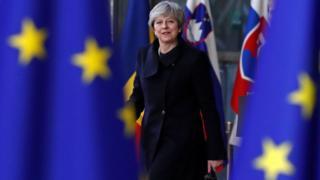 Image copyright
Image copyright
Reuters
The UK has published proposals for how it wants the transition period immediately after Brexit to work.
It says the period should last as long as it takes to “prepare and implement the new processes and new systems”.
Number 10 denied this meant it would be longer than the planned two years.
The document suggests the UK will abide by new EU laws and be involved in talks on future fishing quotas, but will not be able to sign trade deals without the EU’s permission.
There are “only a small number of areas” where the two sides disagree, it says.
These include the status of EU nationals arriving during transition.
The transition period is due to kick in as the UK leaves in March 2019, and is intended to give time to prepare for the long-term post-Brexit arrangements between the UK and the EU, which have yet to be agreed, and to give businesses time to adapt.
The BBC’s Norman Smith said some of the document published by David Davis’s Brexit department would make “uncomfortable reading” for Tory Brexiteers.
It contains no “pushback” on EU demands for free movement of people to continue in the same form during the transition phase, no suggestion of a veto to block new EU laws and no power to implement new international trade deals without the EU’s permission, he said.
The document’s publication comes after more than 60 Eurosceptic Tory MPs set out a list of Brexit demands for the prime minister – and a day before ministers meet at Chequers to try to thrash out a way forward.
The EU has said the transition phase should end on 31 December, 2020, the end of its budget period.
But in the UK’s “draft text for discussion”, it says the length “should be determined simply by how long it will take to prepare and implement the new processes and new systems that will underpin the future partnership”.
It adds: “The UK agrees this points to a period of around two years, but wishes to discuss with the EU the assessment that supports its proposed end date.”
Labour MP Chuka Umunna, of the pro-EU Open Britain campaign, said: “It appears the government wants transition to last indefinitely – a never-ending road to nowhere because the cabinet can’t agree on our future trading relationship with the EU”.
Speaking on the BBC’s Daily Politics, Brexit Minister Steve Baker said: “I’d be quite happy for us to have the minimum period necessary to get out successfully into the new arrangements but that is a matter to negotiate with the European Commission.
“You can see that they want us to exit at the end of the budget period (31 December, 2020) the prime minister is suggesting two years. But what will be the case is, when we’ve agreed, there will be a fixed date.”
One area where the two sides have been expected to clash is citizens’ rights, and whether people from the EU arriving in the UK during transition will have an unrestricted right to stay.
The UK government has said such people should be treated differently to those who are already here before Brexit day – something the EU says it cannot accept.
BBC political editor Laura Kuenssberg said the leak suggested the UK “has softened its position”.
She added that the UK side thinks the positions are close:
Giving evidence to a committee of MPs, Immigration Minister Caroline Nokes stuck to the government’s line, saying EU citizens would “not be subject to the same rights” once Brexit takes place in March 2019.
“I think there’s an important point that EU citizens who come here after we’ve left the EU will have done so knowing that we’re leaving the European Union and will have different expectations to those who have been here for some time and are entitled to settled status,” she said.
The letter to Theresa May from 62 Tory MPs says the UK must not be stopped from negotiating trade deals with other countries, once it leaves the EU, and must gain full “regulatory autonomy”.
Earlier Labour leader Jeremy Corbyn said it was time for Mrs May to spell out clearly what kind of relationship she wanted with the EU, accusing her of “waffle and empty rhetoric” on Brexit at Prime Minister’s Questions.
“Businesses need to know. People want to know. Even Tory backbenchers are demanding to know.”
He suggested the PM had downgraded her negotiation goals from a tariff-free trade agreement to “as much tariff-free trade as possible”.
Mrs May said this was not the case and her desired outcome remained a “bespoke economic partnership” with the EU which also enabled the UK to “take back control” of its laws, money and borders.
“We want to have a good trade agreement with the EU…but we also want to ensure this country takes the opportunities that will be open to us outside the EU to boost our economy.”
She rejected Mr Corbyn’s claims that Brexit would result in a “bonfire of regulations”, insisting the Conservatives record in government showed it was committed to protecting and extending workers’ rights.
UK’s Brexit transition plans released}

